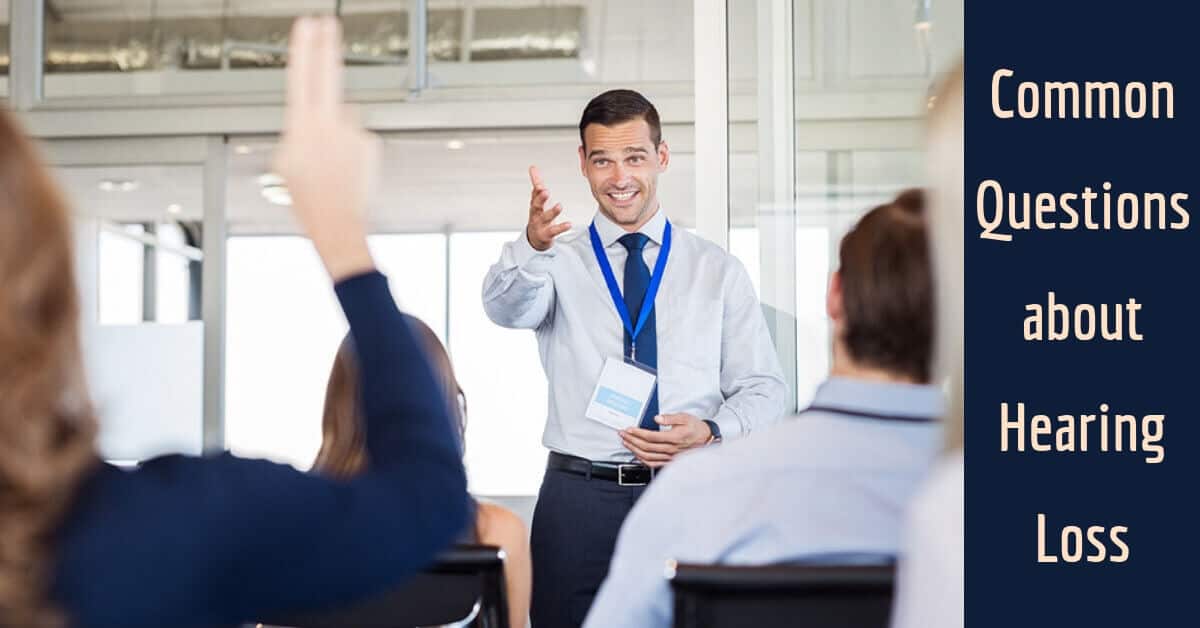
Are you straining to hear? Do you struggle to follow conversations, or pick up on the subtle sounds around you? You’re not alone. Nearly 40 million Americans have hearing loss, and have difficulty hearing at work and at home. If you’ve recently experienced changes in your hearing, here are some of the most common questions and answers about hearing loss.
How Common Is Hearing Loss?
Hearing loss is a lot more common than you might think, and affects people of all ages. Almost half of seniors over the age of 65 have hearing loss, and this number increases with age. Hearing loss also affects adults and teens, and many people experience hearing loss due to exposure to dangerously loud noises at work, at leisure activities, or through overuse of earbuds and personal listening devices.
What Causes Hearing Loss?
Hearing loss can be part of the natural aging process, and many seniors experience some hearing loss as they age. However, hearing loss can also be caused by genetic factors, and 2 to 3 out of every 1,000 babies are born with hearing loss. Teenagers and adults can also lose their hearing from exposure to very loud sounds. These extremely loud noises can damage the delicate hair cells in the inner ear, making it harder and harder to hear clearly. Noises that lead to hearing loss include loud music, power tools, heavy machinery, firearms, fireworks, or even loud city traffic.
If you’re exposed to loud noises on a daily basis, it’s important to protect your hearing by wearing ear protection. You can slip a pair of foam earplugs into your bag, and pop them in whenever you’re in a loud area. Wondering how loud is too loud? If you need to shout to be heard by the person standing next to you, it’s too loud and you risk damaging your hearing.
What are the Signs of Hearing Loss?
Not sure if you have hearing loss? The earliest signs of hearing loss are easy to recognize. If you’ve been struggling to follow conversations, particularly in places with a lot of background noise, you are feeling the early effects of hearing loss. Sounds you miss first are high frequency or high-pitched sounds, like the voices of children, or the birds chirping outside the window. You’ll also have trouble hearing sounds at a distance, during meetings, or in large building like auditoriums or amphitheaters.
Can Hearing Loss Impact Other Areas of my Life?
Hearing loss impacts far more than your ability to hear. When you’ve been struggling to follow conversations for a while, you’ll notice your relationships begin to suffer, and you’re not as close with your friends and family as you once were. Hearing loss also affects your health, and those with hearing loss are less active, are more likely to have cardiovascular problems, and are at a greater risk of slips and falls. Mental health is also affected, and living with untreated hearing loss increases social isolation and depression, and has been linked to more rapid onset of dementia or Alzheimer’s Disease.
Will Hearing Aids Restore Hearing?
Hearing technology of today is truly remarkable. Tiny devices that sit within the ear canal have enough power to run complex programs and provide clear hearing for those with severe hearing loss. Hearing aids help you regain the hearing you lost, make is easy to follow conversations, and participate in the activities you love. Through amplification and enhancement, you’ll be able to hear in challenging listening environments, and even enjoy music again. However, hearing aids don’t restore hearing. Once your hearing has been lost, it will never be the same as before, and hearing aids cannot restore your hearing. To get the most benefit from hearing devices and prevent further hearing loss, it’s critical that you treat your hearing loss as soon as possible.
Pacific Northwest Audiology
Worried you might have hearing loss? Visit Pacific Northwest Audiology for a hearing test to determine your level of hearing loss. We’ll help you discover which sounds you’re missing, and find the device that will help you hear. If you have any more questions about hearing loss, don’t hesitate to ask! Our knowledgeable team of hearing specialists have all the answers to help you make the right decision for your hearing health.
